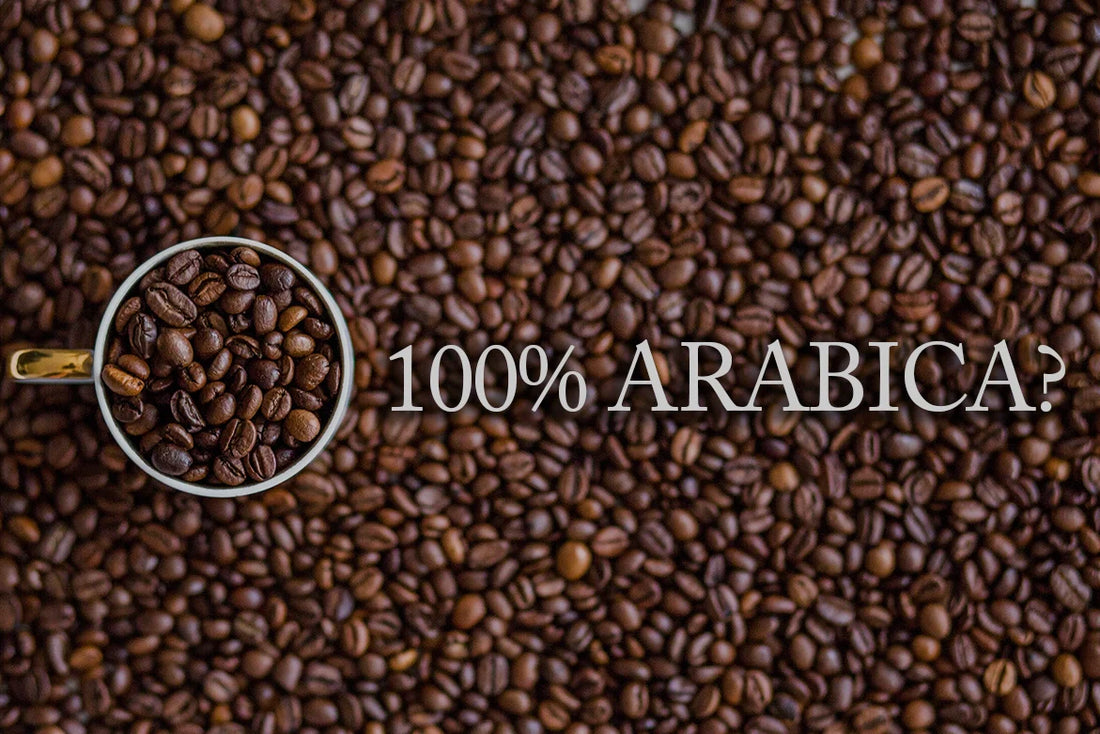
What Does "100% Arabica" on a Coffee Bag Actually Mean?
Share
If you've ever shopped for coffee, you've seen it everywhere: "100% Arabica Beans." This phrase is one of the most common marketing terms in the coffee industry. It’s meant to sound premium, but what information is it really giving you? Is it a guarantee that you're buying high-quality, delicious coffee?
The short answer is no. To understand why, we first need to talk about the two major players in the coffee world: Arabica and Robusta.

The Two Dominant Coffee Species
Nearly all the coffee produced globally comes from two species: Coffea arabica and Coffea canephora (commonly known as Robusta).
Arabica (Coffea arabica) This is the species we associate with the specialty coffee movement. Arabica beans are prized for their complex and aromatic flavor profiles. They can be sweet, fruity, floral, and vibrant. However, they are demanding to cultivate, requiring high altitudes and specific climates to thrive. They also produce a lower yield per plant, which contributes to their higher cost. Despite these challenges, Arabica accounts for about 70% of the world's coffee production, chosen by humans for its superior taste.
Robusta (Coffea canephora) The phrase "100% Arabica" exists specifically to tell you that your coffee does not contain the other major species, Robusta. The flavor of Robusta is not as widely celebrated; it's known for being strong, bitter, and often having woody or even rubbery notes. Its one sensory advantage is that it can produce a very thick, heavy-bodied cup.
So why do people grow it? Because Robusta has a "superpower": it is incredibly resilient. It can grow in hotter climates and at lower altitudes, is less prone to disease, and produces a much higher yield per plant. It also contains significantly more caffeine than Arabica. For these reasons, Robusta makes up about 25-30% of the global coffee market and is primarily used as a component in espresso blends (for a caffeine kick and thick crema) and as the main ingredient in most instant coffee.

The Real Meaning: A Statement of What's NOT Inside
When a coffee bag is labeled "100% Arabica," it is making a simple declaration: the contents are exclusively from the Arabica species, with no Robusta beans blended in. It’s a way of reassuring you that you won't experience the intense bitterness often associated with Robusta.
However—and this is the most important takeaway—the "100% Arabica" label is NOT an indicator of quality. It says nothing about how good that Arabica coffee actually is.
Quality is About More Than Just the Species
Saying a coffee is "100% Arabica" is like saying a wine is "100% Grapes." It's true, but it doesn't tell you anything about its quality. The world of Arabica is incredibly diverse. Within the Arabica species, there are thousands of different varieties, each with a unique genetic makeup and potential for different flavors.
If you’ve ever purchased a bag of single-origin specialty coffee, you've seen this. The label won't just say "Arabica"; it will specify the variety, such as Typica, Bourbon, Geisha, Caturra, or SL28. Think of them like types of apples—a Honeycrisp, a Granny Smith, and a Fuji are all apples, but they offer completely different tasting experiences. The same is true for coffee.
In the specialty coffee community, advertising a coffee as "100% Arabica" is actually a bit strange, because it's already the baseline standard. The quality comes from factors beyond the species, including:
-
The specific variety of the bean.
-
The altitude at which it was grown (higher often means more complex flavor).
-
The care taken in processing and roasting.
Our Conclusion
The phrase "100% Arabica" was likely created to signal quality to a mass market, but it's a very blunt tool. It's a marketing term that's easy for consumers to understand: Arabica is good, Robusta is not.
Here’s a better way to think about it: While most of the delicious coffee you drink will be Arabica, not all Arabica coffee is delicious. The label is a starting point, not a guarantee. It tells you what isn't in the bag, but the true story of quality and flavor is found in the details of variety, origin, and craftsmanship.
